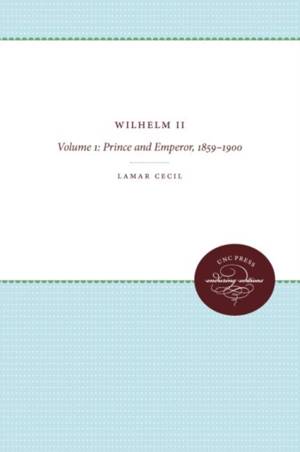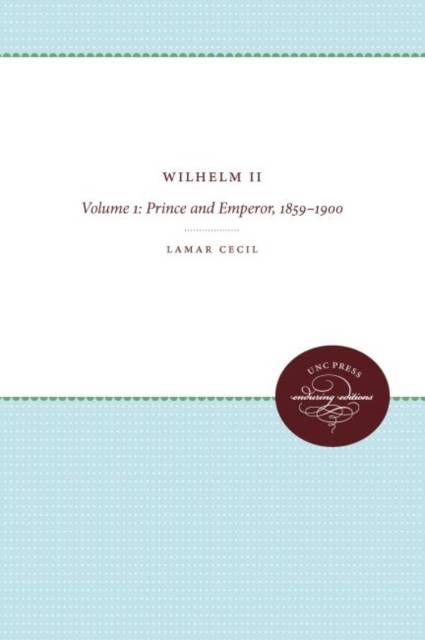
- Afhalen na 1 uur in een winkel met voorraad
- Gratis thuislevering in België vanaf € 30
- Ruim aanbod met 7 miljoen producten
- Afhalen na 1 uur in een winkel met voorraad
- Gratis thuislevering in België vanaf € 30
- Ruim aanbod met 7 miljoen producten
Zoeken
Omschrijving
Wilhelm II (1859-1941), King of Prussia and German Emperor from 1888 to 1918, reigned during a period of unprecedented economic, cultural, and intellectual achievement in Germany. Unlike most European sovereigns of his generation, Wilhelm was no mere figurehead, and his imprint on imperial Germany was profound. In this book and a second volume, historian Lamar Cecil provides the first comprehensive biography of one of modern history's most powerful--and most misunderstood--rulers.
Wilhelm II: Prince and Emperor, 1859-1900 concentrates on Wilhelm's youth. As Cecil shows, the future ruler's Anglo-German genealogy, his education, and his subsequent service as an officer in the Prussian army proved to be unfortunate legacies in shaping Wilhelm's behavior and ideas.
Throughout his thirty-year reign, Wilhelm's connection with his subjects was tenuous. He surrounded himself with a small coterie of persons drawn from the government, the military, and elite society, most of whom were valued not for their ability but for their loyalty to the crown. They, in turn, contrived to keep Wilhelm isolated from outside influences, learned to be accomplished in catering to his prejudices, and strengthened his conviction that the government should be composed only of those who agreed with him. The day-to-day conduct of Germany's affairs was left in the hands of these loyal followers, for the Kaiser himself did not at all enjoy work. Rejoicing instead in pageantry and the superficial trappings of authority, he was particular about what he did and what he read, eliminating anything that was unpleasant, difficult, or tedious. He never learned to listen, to reason, or to make decisions in a sound, informed manner; he was customarily inclined to act solely on the basis of his personal feelings.
Many people believed him to be mad. Even courtiers who admired Wilhelm recognized that he was responsible for the diplomatic embarrassment in which Germany found itself by 1914 and that the Kaiser's maladroit behavior endangered the prestige of the Hohenzollern crown. His is the story of a bizarre and incapable sovereign who never doubted that he possessed both genius and divine inspiration.
Originally published in 1989.
A UNC Press Enduring Edition -- UNC Press Enduring Editions use the latest in digital technology to make available again books from our distinguished backlist that were previously out of print. These editions are published unaltered from the original, and are presented in affordable paperback formats, bringing readers both historical and cultural value.
Wilhelm II: Prince and Emperor, 1859-1900 concentrates on Wilhelm's youth. As Cecil shows, the future ruler's Anglo-German genealogy, his education, and his subsequent service as an officer in the Prussian army proved to be unfortunate legacies in shaping Wilhelm's behavior and ideas.
Throughout his thirty-year reign, Wilhelm's connection with his subjects was tenuous. He surrounded himself with a small coterie of persons drawn from the government, the military, and elite society, most of whom were valued not for their ability but for their loyalty to the crown. They, in turn, contrived to keep Wilhelm isolated from outside influences, learned to be accomplished in catering to his prejudices, and strengthened his conviction that the government should be composed only of those who agreed with him. The day-to-day conduct of Germany's affairs was left in the hands of these loyal followers, for the Kaiser himself did not at all enjoy work. Rejoicing instead in pageantry and the superficial trappings of authority, he was particular about what he did and what he read, eliminating anything that was unpleasant, difficult, or tedious. He never learned to listen, to reason, or to make decisions in a sound, informed manner; he was customarily inclined to act solely on the basis of his personal feelings.
Many people believed him to be mad. Even courtiers who admired Wilhelm recognized that he was responsible for the diplomatic embarrassment in which Germany found itself by 1914 and that the Kaiser's maladroit behavior endangered the prestige of the Hohenzollern crown. His is the story of a bizarre and incapable sovereign who never doubted that he possessed both genius and divine inspiration.
Originally published in 1989.
A UNC Press Enduring Edition -- UNC Press Enduring Editions use the latest in digital technology to make available again books from our distinguished backlist that were previously out of print. These editions are published unaltered from the original, and are presented in affordable paperback formats, bringing readers both historical and cultural value.
Specificaties
Betrokkenen
- Auteur(s):
- Uitgeverij:
Inhoud
- Aantal bladzijden:
- 488
- Taal:
- Engels
- Reeks:
- Reeksnummer:
- nr. 1
Eigenschappen
- Productcode (EAN):
- 9780807865187
- Verschijningsdatum:
- 1/07/2009
- Uitvoering:
- Paperback
- Formaat:
- Trade paperback (VS)
- Afmetingen:
- 152 mm x 229 mm
- Gewicht:
- 748 g

Alleen bij Standaard Boekhandel
+ 183 punten op je klantenkaart van Standaard Boekhandel
Beoordelingen
We publiceren alleen reviews die voldoen aan de voorwaarden voor reviews. Bekijk onze voorwaarden voor reviews.











